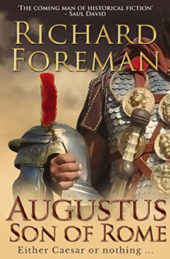Richard Foreman, Firstly, can you tell us about Never Surrender?
Never Surrender is the third and final title in a series of books which I’ve curated. Each collection contains novellas and short stories linked to series I’ve written. As I mentioned in the introduction to Fight or Die, the anthologies are meant to serve as a taster menu. Hopefully readers will have as much fun reading Never Surrender as I did in writing the book. There are new as well as bestselling works in the collection. I so enjoyed writing the Spies of Rome and Dick Turpin stories that I will be producing some more to put together in their own series.
Ancient Rome features prominently in this collection. What first drew you to this period of history?
The Sword of Rome series was borne out of the Augustus books I wrote. The hero, Lucius Oppius, was a popular character – and I wanted to explore the life and campaigns of Julius Caesar. What first drew me to writing about Augustus and Julius Caesar was reading about them, whether through Conn Iggulden and Steven Saylor novels – or the works of Suetonius and Plutarch. Ancient Rome is full of great stories and charismatic figures. Humour, humanity and history combine.
I wrote the Spies of Rome series, featuring Marcus Agrippa and the reluctant hero Rufus Varro, because I wanted to write a spy series combined with murder mysteries. The series provided me with scope to include a few cameos too. Tiberius, Ovid and Tiro, Cicero’s secretary, all feature, among others. Readers can’t help but like Varro, despite or because of his flaws.
Is there a period of history you are yet to set a story in, but would like to?
There are plenty. WW1, the Third Crusade, the Napoleonic Wars, the American Civil War. There are also a number of figures in history I would like to write about, including the Black Prince, Kierkegaard and Joshua Chamberlain.
Your Raffles stories follow the eponymous A. J. Raffles and Bunny Manders. How do you approach writing about well-known and loved characters in such a fresh and exciting way?
One has to be respectful to the source material and use what you feel may be relevant, but it’s also important to make the stories your own. I had fun blending in figures from Sherlock Holmes and cricket’s golden age, such as CB Fry and WG Grace. I wanted to make each story hinge upon a clever twist too.
I read several Raffles stories by Hornung, but not all of them. Partly because I did not want to be confined by the original character and stories. In some ways Bunny is the hero of my Raffles series too. He gets the girl and acts as Dr Watson to Raffles’ Holmes.
Several of the characters in this collection seem to be anti-heroes. What attracts you to writing about this type of character?
Anti-heroes are often more interesting (conflicted, colourful, tragic) – as well as funnier. I wanted to my Dick Turpin to be Byronic. Lucius Oppius is akin to a Roman Richard Sharpe. There is of course natural scope for anti-heroes to redeem themselves as well, which makes for a great story.
Can you tell us about your next project?
I will aim to finish a couple of short story collections this year based around the Spies of Rome and Dick Turpin novels. I am also currently working on a contemporary spy thriller, set during a Graham Greene conference. So, I am currently reading, or rather re-reading, Greene’s work, which is no hardship. At some point in the next year or so I also intend to start a series based around the Black Prince. It’s not so much a case of never surrendering, as never ceasing to write something new. History is full of fascinating and resonating stories, more than anyone can write.
Richard Foreman is a bestselling writer and the author of Never Surrender.
Interview by Chantelle Lee.







